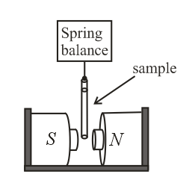Magnetic Properties of Materials
Magnetic Properties of Materials: Overview
This topic covers concepts, such as Magnetic Properties of Matter, Diamagnetic Substances, Transformer Cores & Telephone Diaphragms etc.
Important Questions on Magnetic Properties of Materials
Which one of the following species is diamagnetic in nature?
The area enclosed by a hysteresis loop is the measure of ____________.
A magnetic material filed in U-tube. When magnetic field is applied at one end of U-tube then level of magnetic material is changed in tube as shown in figure. The material in U-tube may be -

Copper is
A diamagnetic object is hung by a thread from a very sensitive spring balance between the poles of an electromagnet. When the magnetic field of the electromagnet is increased in magnitude, the reading of the spring balance will

Curie temperature is the temperature above which
What material is used to make core of the speaker diaphragm?
The magnetic susceptibility is negative for
What a diamagnetic substance is brought near the north or south pole of a bar magnet, it is
Meissner effect is strictly followed by
In superconductivity the conductivity of a material becomes
The hysteresis loss in soft magnetic materials must be kept ______
Which of the materials gets repelled by a magnetic field?
Needles , and are made of a ferromagnetic, a paramagnetic and a diamagnetic substance respectively. A magnet when brought close to them will
Magnetic moment of diamagnetic substances-
Curie temperature is the temperature above which:
Substances, when placed in a magnetic field acquire feeble magnetisation in the direction opposite to that of the applied field are called
The relative permeability of a substance is slightly less than unity and that of substance is slightly more than unity. Then,
Point out the best representation of relation between magnetic susceptibility and temperature for a paramagnetic material.
Needles and are made of a ferromagnetic, a paramagnetic and a diamagnetic substance respectively. A magnet, when brought close to them, will
